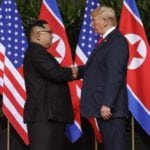 Weird Stuff
Weird Stuff  Weird Stuff
Weird Stuff  Animals
Animals 10 Inspiring Tales of Horses Being Human
 Mysteries
Mysteries Top 10 Haunting Facts About the Ghost Ship MV Alta
 History
History 10 Surprising Stories About the Texas Rangers
 Humans
Humans 10 Philosophers Who Were Driven Mad by Their Own Theories
 Miscellaneous
Miscellaneous 10 Video-Game-Worthy Weapons and Armors from History
 Weird Stuff
Weird Stuff 10 Psychics Who Accurately Predicted Wartime Events
 The Arts
The Arts 10 Pieces of Art Inspired by a Broken Heart
 Health
Health 10 Science Fiction-Sounding New Medical Treatments
 History
History 10 Surprising Facts About the Father of Submarine Warfare
 Weird Stuff
Weird Stuff 10 Times Real Laws Were Based on Bizarre Hypotheticals
 Animals
Animals 10 Inspiring Tales of Horses Being Human
 Mysteries
Mysteries Top 10 Haunting Facts About the Ghost Ship MV Alta
Who's Behind Listverse?

Jamie Frater
Head Editor
Jamie founded Listverse due to an insatiable desire to share fascinating, obscure, and bizarre facts. He has been a guest speaker on numerous national radio and television stations and is a five time published author.
More About Us History
History 10 Surprising Stories About the Texas Rangers
 Humans
Humans 10 Philosophers Who Were Driven Mad by Their Own Theories
 Miscellaneous
Miscellaneous 10 Video-Game-Worthy Weapons and Armors from History
 Weird Stuff
Weird Stuff 10 Psychics Who Accurately Predicted Wartime Events
 The Arts
The Arts 10 Pieces of Art Inspired by a Broken Heart
 Health
Health 10 Science Fiction-Sounding New Medical Treatments
 History
History 10 Surprising Facts About the Father of Submarine Warfare
10 Mind-Blowing Things That Happened This Week (11/23/18)
Keeping up with the news is hard. So hard, in fact, that we’ve decided to save you the hassle by rounding up the most significant, unusual, or just plain old mind-blowing stories each week.
This week, with the dust finally settled and the US midterms receding in the rearview mirror, it was time for stories from the rest of the world to take center stage once again. Away from American shores, Russia received an unexpected humiliation, Cambodia reopened some old wounds, and Papua New Guinea went more than a little nuts. But there were still at least a couple of stories coming from the States. And, once again, one of them involved guns. Quelle surprise.
10 A Mass Shooting Hit A Chicago Hospital
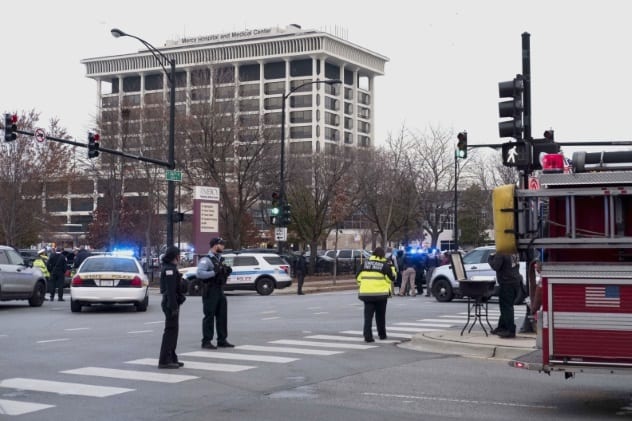
For years, 32-year-old Juan Lopez had cultivated a troubling track record of threatening people with guns.[1] Despite these warning signs, authorities failed to take his concealed carry permit away from him. On Monday, the inevitable happened. After getting in an argument with his ex-fiancee at Chicago’s Mercy Hospital, Lopez pulled out his Glock and started shooting. He didn’t stop until responding officers shot him dead.
Lopez killed not just his ex, Doctor Tamara O’Neal, but also pharmacy resident Dayna Less and police officer Samuel Jimenez. While it’s debatable whether his actions qualified as a mass shooting (the standard definition is a shooting that results in four deaths, but not every source agrees on whether to count the perpetrator among them), they certainly qualified as yet another depressing example of American gun violence in a year that’s been full of them.
At the heart of the story was Lopez’s clear psychological unfitness to own a firearm. He’d threatened O’Neal with a gun before. He’d threatened to shoot up his old workplace. Sadly, authorities ignored these warning signs.
9 Russia Lost The Interpol Presidency In A Shocking Vote

Back in September, Interpol’s president mysteriously vanished in his native China. Aside from showing that Beijing is super serious about going after anyone who stands against it, the disappearance of Meng Hongwei meant Interpol suddenly had a vacant seat at the head of the table.
This week, all 94 member nations voted on who would replace Hongwei. Going in, the strong favorite was Russia’s Alexander Prokopchuk, already vice president of Interpol. Although the US and some European nations campaigned against him, it was believed the vote was in the bag.
Well, it wasn’t. In a shock move, Interpol’s presidency instead went to its Asian VP, South Korea’s Kim Jong-yang.[2] The debacle demonstrated just how severely isolated Moscow has become following the attempted nerve agent assassination of a spy in Britain.
There was more drama at the summit on the sidelines. While Russia was getting locked out of the presidency, Russian allies Serbia were ensuring Kosovo’s application to join the body was rejected. Pristina has responded by slapping 100-percent tariffs on goods from Serbia.
8 PNG’s Parliament Was Attacked By Its Own Security Forces
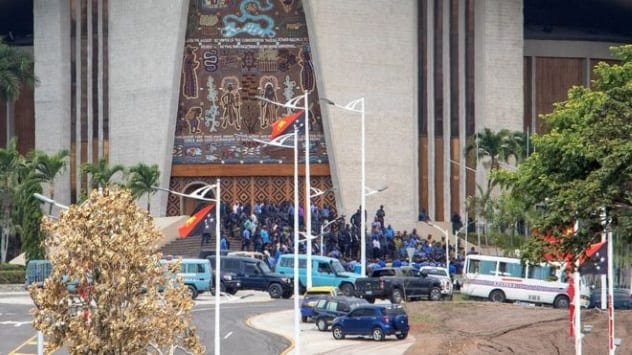
In the normal course of things, a nation’s security forces are the guys meant to stop protestors from smashing the Parliament up. But things are rarely normal in Papua New Guinea (PNG), an impoverished nation that ranks as one of the poorest countries in the world. On Tuesday, hundreds of police officers and soldiers stormed the Parliament in Port Moresby. Their reason? The government hadn’t paid their wages.[3]
Earlier this month, PNG hosted the Apec summit, an important gathering of Pacific nations that is traditionally very expensive to police. To ensure that none of Port Moresby’s violent criminal gangs made off with the delegates or anything, the government promised thousands of police and army regulars a 350-kina ($104) bonus to police the event. They then failed to pay up. Security forces took out their frustration on the Parliament.
Windows and furniture were smashed during the hours-long riot, and a small number of lawmakers were beaten up. The government seems to have now gotten the message, promising to pay bonuses as soon as possible.
7 We Redefined The Kilogram

Until last week, one of the most important pieces of metal in the entire world sat in a glass dome at the International Bureau of Weights and Measures in Sevres, Paris. Known as Le Grand K, the platinum block was the international definition of a kilogram. Whatever it weighed was what a kilogram was . . . even if it somehow lost or gained weight.
This last bit is important, as losing weight was exactly what Le Grand K was doing. Over the last 100 years, it appeared to have lost 50 micrograms, about the weight of a fly’s wing. But since Le Grand K was the gold standard for a kilogram, losing weight was impossible. In other words, every century, what a kilogram actually was was being redefined by 50 micrograms or so. Not really a problem for most of us, but a massive headache for certain scientists.
So, last Friday, they dropped Le Grand K’s official position. In a unanimous vote, 60 countries changed the definition of a kilogram to one based on Planck’s constant.[4] This new, more accurate definition will come into force next May and has been called the greatest upheaval of the metric system since the French Revolution.
6 The Maldives Declared It Would Rejoin The Commonwealth
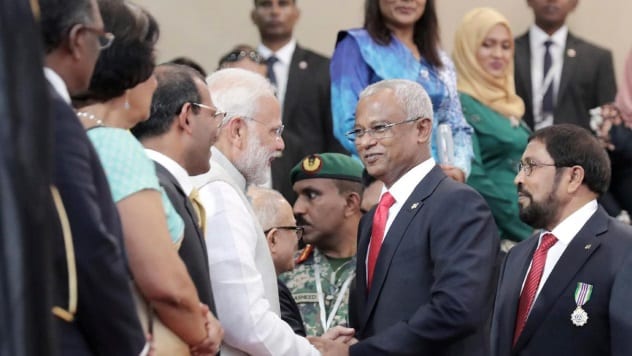
On October 13, 2016, the Maldives became the most recent state to leave the 53-member Commonwealth of Nations, after other members made the not-unreasonable point that President Yameen Abdul Gayoom was trying to turn the country into a dictatorship. Coming almost exactly three years after The Gambia’s acrimonious departure, it created the false impression that Islamic nations were feeling the institution.
We say “false impression” because The Gambia applied to rejoin in January 2018, following the exile of its autocratic leader Yahya Jammeh. This week, the Maldives followed suit. After Gayoom’s burgeoning police state was unexpectedly voted out in a shock election in September, new president Ibrahim Mohamed Solih announced that the Maldives will reapply to the Commonwealth.[5] Given how quickly The Gambia was readmitted, it seems likely that the Indian Ocean nation will soon be a fully paid-up member again.
It’s a remarkable turnaround for the institution. Before the Maldives and The Gambia, the last member to leave was Zimbabwe in 2003. In May 2018, new president Mnangagwa announced that Harare, too, would apply to rejoin. If successful, that would mean no member has left the Commonwealth on a permanent basis since Ireland back in 1949.
5 The Head Of Russia’s GRU Died

Igor Korobov was not a popular man. The head of Russia’s Main Intelligence Directory (GRU), he was accused by the US of election meddling and by the UK of attempting to assassinate an ex-spy on British soil using a weapon of mass destruction—a botched attack which wound up accidentally killing a British citizen. Interestingly, this last one also made him incredibly unpopular in the Kremlin. It’s said that Vladimir Putin gave Korobov an almighty chewing out for bungling the operation, which led to heavy sanctions against Russia.
Well, Korobov need not worry about his popularity anymore. On Thursday, Russian media announced that he’d died after a “lengthy and grave illness.” While it’s tempting to wonder if that’s a euphemism for “we poisoned him with Novichok,” CBS reports it’s a standard Russian euphemism for cancer.[6]
Korobov is now the second GRU head to die in two years. He leaves behind an agency with a severely damaged reputation. It’ll be interesting to see if his successor can rebuild bridges with Western capitals.
4 The President And The Chief Justice Got In An Almighty Spat

It’s normally rare for a chief justice to speak out against a sitting president, but since when are these times normal? This week, President Trump and Chief Justice Roberts, the highest-ranking judge in the US, got in an almighty spat. At its heart was the vital question of judicial independence in modern America.
On Monday night, the White House had a new policy blocked by the Ninth Circuit Court of Appeals. The president responded by accusing the judge who issued the ruling of being an “Obama judge”—meaning someone who was appointed by the former president and who has an inbuilt bias toward left-wing policies. In response, Chief Justice Roberts, who was appointed by George W. Bush, released the following statement:
We do not have Obama judges or Trump judges, Bush judges or Clinton judges. What we have is an extraordinary group of dedicated judges doing their level best to do equal right to those appearing before them. That independent judiciary is something we should all be thankful for.[7]
Aside from being nearly unprecedented, Justice Roberts’s intervention was also a warning for the future. The White House clearly thinks there’s a liberal bias in the court system and that certain judges can’t be trusted. Chief Justice Roberts, in turn, clearly thinks that such statements threaten the independence of the judiciary. For now, this is just a spat. But it has the potential to turn into a gigantic dust-up that could stretch the Constitution to its absolute limits.
3 The Jewish Bomb Hoaxer Was Finally Sentenced
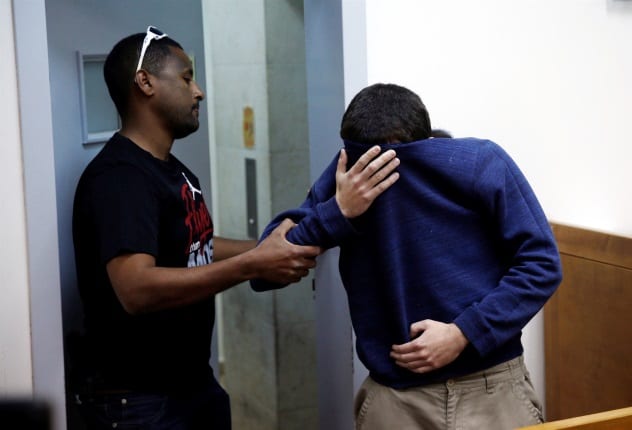
It was a case that turned assumptions on their heads. Back in early 2017, a huge quantity of bomb threats hit thousands of Jewish centers across the world. Synagogues in the UK were targeted, as were Jewish schools and museums. In the US, community centers were forced to evacuate, alongside the Israeli embassy and the offices of the Anti-Defamation League. It all looked like the work of an anti-Semitic monster with a poisonous grudge against Jews.
Until, that is, teenager Michael Ron David Kader was finally arrested in Southern Israel. An American-Israeli of Jewish heritage, he was soon revealed to be the mastermind behind the bomb threats.
This week, Kader was finally sentenced to ten years in prison.[8] His defense tried to argue that his autism made him unfit to stand trial, but the judge determined he was intelligent enough to understand what he was doing.
2 Theresa May Unexpectedly Survived A Brexit ‘Coup’
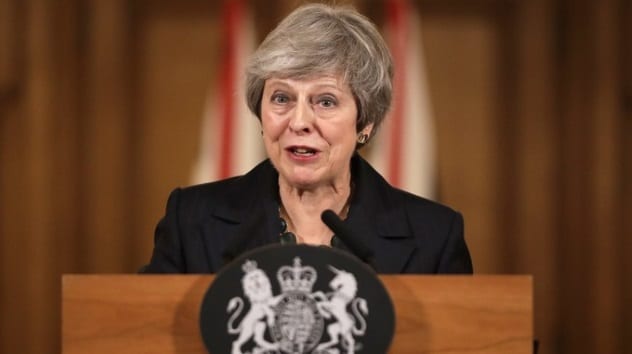
Theresa May may have the least forgiving job in Western politics. The prime minister of Great Britain, she’s in charge of delivering an exit from the European Union that she doesn’t really believe in, that several constituent parts of the UK don’t want (Scotland, Northern Ireland, and Gibraltar voted against it), and to do so without dynamiting the entire British economy. At the same time, she’s leading a party in which loudly demanding the hardest possible Brexit has become a badge of honor.
It was this last bit that nearly doomed her over the weekend. After the government published its widely despised draft plan for Brexit, a group of Conservative backbenchers led by arch Brexiteer Jacob Rees-Mogg attempted to launch a coup. Under Conservative Party rules, a no confidence vote can be triggered against May if 15 percent of MPs write to the chairman of the 1922 committee requesting one. On Friday, it looked like Rees-Mogg had both the numbers and the momentum. It was conceivable that the UK government was only hours away from total collapse.
Only it didn’t quite work out like that. At time of writing, the 48 required letters have failed to materialize. Theresa May’s authority has been strengthened. The Brexiteer coup is seemingly dead.[9]
Of course, this may just be a temporary respite. The House of Commons still has to vote on May’s deal, and there’s every indication that she doesn’t have the numbers. Losing that vote almost certainly would doom her premiership. Still, she’s unexpectedly survived her latest challenge. It looks like May will live to fight another day.
1 Two Leaders Of The Khmer Rouge Were Finally Convicted Of Genocide
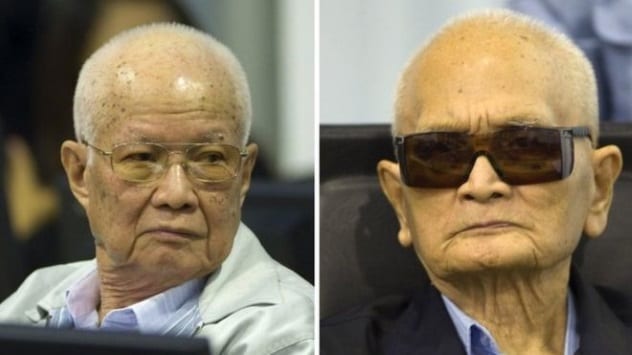
The Cambodian genocide is widely regarded to have been one of the bloodiest events of the 20th century. From 1975 to 1979, Pol Pot’s Khmer Rouge regime murdered on an extraordinary scale, killing between two and three million people—equivalent to a third of Cambodia’s total population. The killing fields and prisons like S-21 are infamous today for the sheer, unimaginable cruelty perpetrated within them. In terms of impact on a single population, only the Holocaust and the Armenian and Rwandan genocides really come close.
Yet it was long debated whether the Cambodian genocide really was a genocide. The majority of those killed were Khmer, the same ethnic group as their murderers. Campaigners, though, contended that the simultaneous extermination of the Cham Muslim minority and the forced deportation of the Cambodian Vietnamese meant the term “genocide” could apply.
Last Friday, the law officially agreed with them. Two high-ranking Khmer Rouge officials received convictions for genocide for their role in Pol Pot’s bloody regime. They are the first Cambodians to be found guilty of genocide during the dictatorship.[10]
The convictions of Nuon Chea and Khieu Samphan are a victory for campaigners, but a bittersweet one. Set up in 2006, the UN-backed Extraordinary Chambers in the Courts of Cambodia (ECCC) now has a mere three convictions to its name. Prime Minister Hun Sen—a former Khmer Rouge member himself—has strongly opposed any more trials, and it seems like the ECCC will now shut down. Sad as it may be to think, it seems the majority of those who committed crimes in the genocide will never be punished.
Missed the news lately? Catch up on more mind-blowing events from November 16, 2018, and November 9, 2018.
